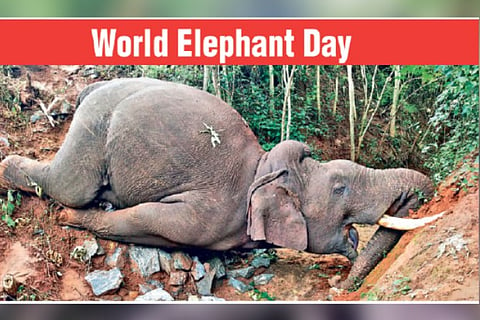

Coimbatore
“Because of the COVID-19 situation, this comprehensive study couldn’t be carried out by visiting the field. Yet, our study has already begun with the available documents. We expect to complete this exercise in six months, but the pandemic is likely to cause a delay,” said Shekhar Kumar Niraj, Additional Principal Chief Conservator of Forests (APCCF), who heads the committee.
Niraj heads the committee comprising three other experts, Ajay Desai from Bengaluru, Sivaganesan from Chennai, C Arivazhagan, managing trustee of Indo-American Wildlife Society in Chennai, besides veterinarians M Kalaivanan, A Pradeep and D Boominathan, world wildlife fund, Coimbatore. This setback for the scientific study comes on the World Elephant Day amid a decline in the population of pachyderms in Tamil Nadu. “Along with the rise in elephant mortality, their numbers too have dwindled in the State. It’s a serious issue as their population has dropped approximately by about one per cent over a period of time. It now requires a comprehensive scientific study covering all aspects to know the cause of their mortality,” he added.
In an alarming trend, about 17 elephants have lost their lives so far this year due to multiple causes in Coimbatore forest as against 11 and 12 deaths last year and in the previous year. However, the elephant mortality was at a high of 19 in 2017 and 22 in 2016.
Wildlife activists rue that developmental works in forest cover, fragmentation of elephant corridors, habitat invasion by alien species, uncontrolled pesticide use by farmers and food degradation issues have taken a toll on the elephants.
With activists suggesting the possibility of toxic pesticide sprayed by farmers on plantations and eventually washed into the water body to have an impact on the health of elephants, the forest department has for the first time sent biological samples of a elephant that died on Monday due to ailment to Salim Ali Centre for Ornithology and Natural History (SACON) at Anaikatti for examination.
“Of the multiple reasons for their death, fragmentation of the habitation mainly in the key Kallar corridor appears to be the foremost. The movement of wildlife has been blocked by a NH running through the corridor and it has been a long pending project by the government to build a flyover to go through without disturbing the wild. Securing this key corridor will go a long way in overall conservation of the elephants,” said Boominathan, Landscape co-ordinator, WWF.
Visit news.dtnext.in to explore our interactive epaper!
Download the DT Next app for more exciting features!
Click here for iOS
Click here for Android